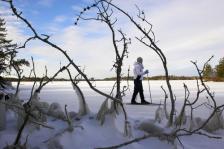Have you ever heard that drinking cold water can help you lose weight? This idea has had many weight loss enthusiasts chugging glasses of icy cold water through the day, getting frequent and uncomfortable brain freezes, and then throwing their hands up in despair when the pounds don’t melt off as promised.
But in reality, although it goes far beyond simply sipping a cool beverage, there actually is some valid scientific evidence that exposure to cold temperatures can help you to lose weight. In this article, you’ll find out if exercising in cold weather helps you burn more calories and if cold temperature exposure helps with fat loss.
How Body Temperature Works
On a TEDTalk video in 2010, NASA materials engineer Ray Cronise discussed how to lose weight by exposing the body to cold temperatures. Later, I hosted Ray and author Tim Ferriss on a podcast to discuss How to Manipulate Your Body Temperature to Burn More Fat.
In both these cases, we learned about thermogenesis, which is your body’s process of heat production. Your body works best at an ideal temperature. So when you get cold, or consume something cold (such as ice water), your body must temporarily increase the rate at which you burn calories in order to keep you warm or to warm whatever cold substance that you ingested.
Shivering is a perfect example.
Shivering produces heat as your body burns calories to make the muscles contract, and produce heat in the process.
But your body can produce heat in other ways too. For example, there is a type of fat called “Brown Adipose Tissue” or BAT for short, which is found in high amounts in human babies, and also in hibernating mammals.
This brown fat is able to take free fatty acids, from the body’s own fat stores or from dietary sources of fat, and very efficiently produce heat to keep a baby or hibernating mammal warm. But brown fat is something you can make too: with exposure to cold temperatures, or exercising in cold temperatures, your body can actually convert regular white fat into this calorie-burning brown fat.
How to Use Cold Weather to Lose Weight
So now that you know that you can burn more calories when you expose your body to cold temperatures or exercise in the cold, here are 5 practical ways that you can use cold exposure to create more calorie-burning brown fat tissue:
- Start and end every day with a cold shower. Not only can this type of cold exposure decrease your appetite, making you less likely to eat excessive calories at breakfast or dinner, but the morning shower also jumpstarts your day with calorie-burning thermogenesis.
- If you live in a cold climate, go outside to exercise. While the heated indoor gym and health club is certainly comfortable, you’ll burn far more calories by taking it outside. Be ready to be slightly cold as you start into a lower temperature bike ride, run, or brisk walk, but realize that you’ll significantly warm-up within just 10 minutes of activity. Be sure to protect body parts that are cold sensitive, such as your face, hands, and feet, with a scarf, gloves, and wool socks.
- Include water exercise. Perhaps you’ve heard of the “Michael Phelps” diet, which was described in a Wall Street Journal article a little while back. The astonishing “diet” contains 12,000 calories per day. Breakfast includes 3 fried-egg sandwiches loaded with cheese, lettuce, tomatoes, fried onions, and mayonnaise, plus one 5-egg omelet, one bowl of grits, 3 slices of French Toast topped with powdered sugar, and three chocolate-chip pancakes. Lunch was one pound of pasta, two large ham and cheese sandwiches with mayo on white bread, and a 1,000-calorie energy drink. Dinner was another pound of pasta, an entire pizza, and more energy drinks. One reason Michael can eat so many calories and stay thin is that he’s constantly submerged in water, which makes his body have to burn calories to maintain temperature. While you shouldn’t use this as an excuse to indulge in eating unhealthy foods, you should certainly include water exercise as a way to increase your calorie-burning and cold-temperature fat loss.
- Use ice. Let’s say you live in a warm climate, and you don’t like to exercise in the water. You can still lower your body temperature by using a simple trick with ice. Simply fill your sink or a basin with cold ice water, and submerge your feet in the water (while gritting your teeth) for 5-15 minutes. Your body will respond by increasing calorie-burning to maintain temperature. For a greater, but significantly more unpleasant effect, you can take an ice bath for the same period of time.
- Don’t be afraid to shiver. It’s OK to have goosebumps! After I take a cold shower in the morning, I typically keep my body burning extra calories by wandering around the house doing chores and making breakfast while wearing as few clothes as possible. The shivering and goosebumps may be uncomfortable at first, but your body adapts quickly, within as little as two weeks.
Any of the methods above will burn far more calories and jump-start the significant calorie burning benefits of thermogenesis better than simply drinking cold water.
DISCLAIMER: The content on this website is intended for informational and educational purposes only. Consult a doctor for medical advice, treatment or diagnosis.
